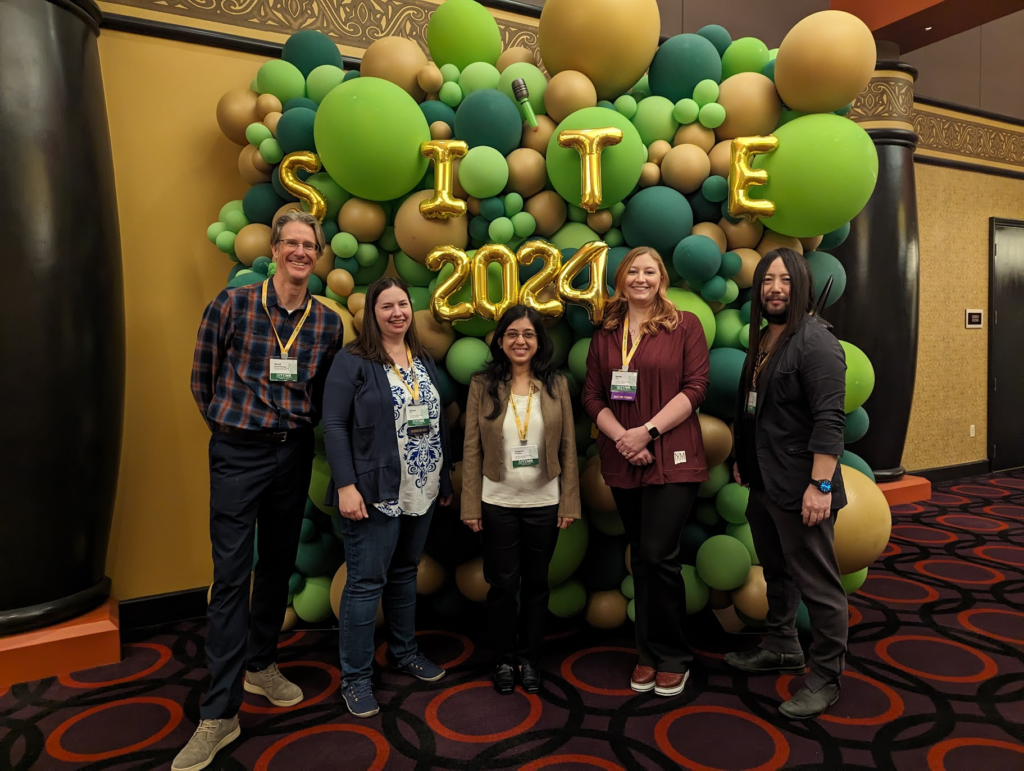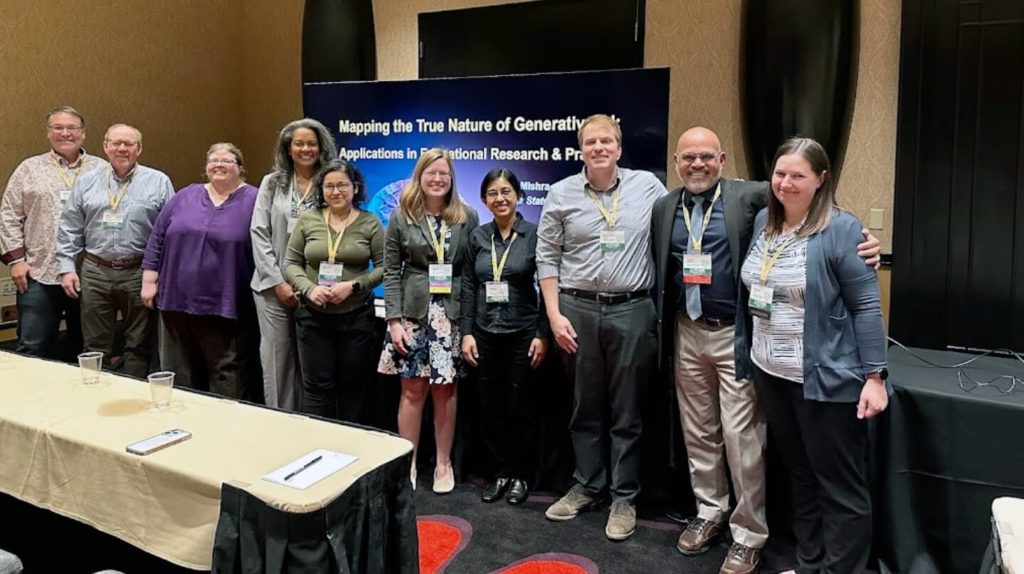I thoroughly enjoyed attending the 2024 Society for Information Technology and Teacher Education conference in Las Vegas, Nevada last week. Great people, great ideas. New and old friends. A quick recap:
Friends!
The best part of this conference was meeting up with some great friends from Arizona State, New Mexico State, and Monash Universities. (including my friend Kevin Close, now at the Spencer Foundation!)


SITE Participants from New Mexico State University
1. Symposium: Mapping the True Nature of Generative AI: Applications in Educational Research & Practice
Symposium Leaders: Punya Mishra (ASU), Melissa Warr (NMSU) & Michael Henderson (Monash).

This symposium featured 6 papers that explored the nature of Generative AI from various angles, both theoretical and practical, touching on different areas like teacher training, doctoral studies, and more.
1A. Using LLMs to Develop Pedagogical Content Knowledge
My NMSU colleague Suparna Chatterjee and I presented this paper on an application of Large Language Models (LLMs) like ChatGPT in educational settings to simulate teaching and learning experiences. We presented method for pre- and in-service teachers to develop Pedagogical Content Knowledge (PCK) through role-play activities with LLMs acting as students with misconceptions in subjects like math and science. By engaging in dialogues with these simulated students, educators can refine their teaching strategies, deepen their understanding of subject matter, and enhance their reflective practices. The paper outlines how this approach not only supports the development of critical teaching skills but also offers a low-risk, cost-effective, and repeatable method for practicing and improving educators’ ability to address students’ misconceptions.
During our discussion, I realized that perhaps the most critical aspect about this approach is that the AI is NOT real student, it has its own idiosyncrasies, and that is a good thing. (see Slides 29-44 Above)
Read the Proceedings Paper Here
1B. Building Theory Using Generative AI
This was a fun presentation! I collaborated with ASU colleagues Kevin Close and Punya Mishra to explore the experience of attempting to write an academic paper with an LLM. We weren’t really using the LLM for the writing itself but rather for theory development. (see Slides 67- 93 above)
2. Four Pillars of Technology Infusion: Using Q Methodology to Examine Candidate Perspectives on Their Preparation to Use Technology
Authors: Jon Clausen (Ball State University), David Rutledge (New Mexico State University), Arlene Borthwick (National Louis University), Shannon Driscoll (University of Dayton), Yi Jin (Kennesaw State University), Debra Sprague (George Mason University), Melissa Warr (New Mexico State University), and Mia Williams (University of Wyoming)
Abstract: Technology infusion has been proposed as essential in preparing teacher education candidates to use technology within their own instructional practices. Foulger (2020) articulated four pillars needed for technology infusion. These include the educator preparation program (EPP) curriculum, candidate beliefs and efficacy, how technology has been modeled by faculty, and whether candidates have had opportunities to critically think about and use technology throughout their preparation including within clinical practice. This study examines teacher education candidates’ perspectives about their preparation to use technology within their EPPs. Candidates from seven institutions provided their perspectives about technology infusion within their respective programs. Q methodology and factor analysis were used to identify how candidates characterized their preparation as aligned with the four pillars of technology infusion in teacher preparation.
3. Beat Bias: A Dystopian Musical
Author: Melissa Warr, New Mexico State University
The original name of this presentation was “Beat Bias? Personalization, Bias, and Generative AI.” But, given the presentation was a mere hour before the conference 90’s party, I decided to jazz it up a bit and turn it into a musical. ChatGPT did a great job of adding a typo in the image below–it matches our BAIS research group (Biased AI in Systems of Education)!

Abstract: Media and technology companies have claimed that advances in AI, particularly generative AI (GenAI) such as large language models (LLMs), will enable powerful individualized and personalized learning applications enabled by methods such as intelligent tutoring systems. However, efforts to personalize interactions with technologies in other fields, such as advertising and social networks, have resulted in negative consequences on users, and applying similar principles to education must be done with caution. To limit unintended consequences, teachers must think critically about AI and carefully evaluate appropriate use. In this paper, I review research in personalized learning and critical media studies on the impact of technological customization. I then present an empirical study of three LLM models that illustrates how bias might unexpectedly present itself in educational use of these tools. I conclude by discussing how teacher education should emphasize the teacher-student relationship, learner agency, and critical digital literacy in personalized learning, supporting more appropriate uses of generative AI in educational contexts.
4. Panel: Researching Technology Infusion in Teacher Preparation
Authors: Jon Clausen (Ball State University), David Rutledge (New Mexico State University), Arlene Borthwick (National Louis University), Shannon Driscoll (University of Dayton), Yi Jin (Kennesaw State University), Debra Sprague (George Mason University), Melissa Warr (New Mexico State University), and Mia Williams (University of Wyoming)
Abstract: Panelists for this session worked together to refine a research tool to collect teacher candidates’ perspectives on their preparation to use and integrate technology in teaching and learning. Development of the tool began through a study proposed at NTLS in 2018 (Clausen et al., 2021) and expanded through alignment of the research tool to the four pillars that support a technology-infused teacher preparation program design: technology integration curriculum, experiences that model innovative uses of technology, practice with reflection, and development of technology self-efficacy for technology integration (Foulger, 2020, Graziano et al., 2023). Panelists will provide an overview of the four pillars, followed by a brief summary of selected instruments used to assess candidate outcomes (Christensen, 2021), intent to use technology in their practice (Foulger et al., 2021), and perspectives on their preparation to integrate technology in teaching and learning (Clausen et al. 2023; Williamson et al., 2023). Panelists will conclude their introductory remarks with an explanation of how working collaboratively, they aligned statements used in a Q sort with the four pillars to obtain a holistic view of technology infusion. Guiding questions will facilitate discussion by attendees about the use of Q Methodology at their institutions and engagement in further collaborative efforts to investigate and enhance technology infusion in teacher education.